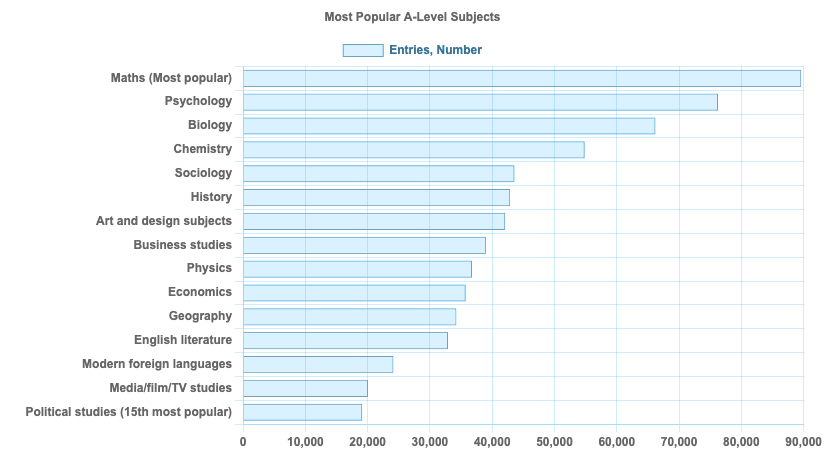Best A levels to take: Ultimate Guide for Subject Selection

September 15, 2025 | 5 months | A-Level Fundamentals
Choosing the right A-levels depends on your career goals and personal strengths, but some subjects offer exceptional versatility and are highly valued by universities and employers.
"Facilitating subjects" like Mathematics, English Literature, Physics, Biology, Chemistry, History, Geography, and modern foreign languages are considered the gold standard, as they demonstrate critical thinking, analytical skills, and academic rigour that open doors to virtually any university course or career path.
These subjects are particularly recommended if you're unsure about your future direction, as they keep maximum options available. However, the best A-level combination for you should align with your specific aspirations. If you're planning to study medicine, Biology and Chemistry are essential; for engineering careers, Mathematics and Physics are crucial. Meanwhile, business-minded students might benefit from Economics, Mathematics, and Business Studies.
The key is striking a balance between subjects that meet your target university's entry requirements and those that genuinely interest you, because passion and engagement often lead to better grades and long-term success.
Achieve A-Level Excellence!We can guarantee exam success at CloudLearn.
What is the best A Level to take? Best combinations for each university degree
The primary distinction to consider is whether you have already decided on a career path. This is the easiest way to determine which A-level subject you can choose, as you only need to base your selection on university requirements.
Science & healthcare careers
The two essential subjects to choose if medicine school is your choice are Chemistry and Biology. However, we highly recommend including Maths and Physics in the list, as this combination will open the doors to all universities without restrictions.
Given that these careers cover the same basic knowledge, Nursing, Dentistry, Pharmacy, and Veterinary can leverage the same subjects as Medicine. In the case of Physiotherapy, you may also want to consider PE. Additionally, for A-levels in marine biology, Environmental Science is a good choice. Take a look at which subjects are core or complementary in each case.
| Science & Healthcare | Recommended A Levels | Complementary A Levels |
| Medicine |
Biology Chemistry |
Maths Psychology |
| Nursing |
Biology Psychology |
Sociology Health & Social Care |
| Pharmacy |
Biology Chemistry |
Maths Physics |
| Dentistry |
Biology Chemistry |
Maths Physics |
| Veterinary |
Biology Chemistry |
Maths Physics |
| Physiotherapy |
Biology PE |
Psychology Sociology |
| Marine biology |
Biology Chemistry |
Geography Environmental Science |
Business and finance careers
Best A Levels to take for Economics
In the same way that Architecture combines Physics and Design, Economics merges social and hard sciences, as it includes how monetary equations affect people and vice versa. Accounting and banking, on the other hand, focus more on microeconomics and managing finances for organisations and individuals.
However, for these three careers, the main subjects are the same: Maths (regular or Further), Economics, and Politics. Adding Business Studies to the equation makes this combination perfect.
| Business and Finance | Recommended A Levels | Complementary A Levels |
| Economics |
Maths Further Maths Economics Politics |
Business Studies Sociology |
| Accounting |
Maths Economics Business Studies |
Sociology |
| Banking |
Maths Economics Business Studies |
Further Maths |
Law and social sciences careers
Best A Levels to take for Law
There are indeed no specific A-levels for law that you need to take, since university requirements are, in this case, only focused on the final marks you achieve. However, there are specific subjects we recommend taking: Law, for obvious reasons, as it will give you insights into the topics you will later learn at university; English language and/or Literature, as you will develop your essay writing and argumentation skills; and Maths. Although it is not directly related to this degree course, Maths can help you keep your university options open to different choices and will also enhance your logical thinking. Other options include History and Geography, which will also equip you with a more open framework for the topics you will study later.
Best A Levels to take for Criminology
Sociology and Psychology are key A-levels for Criminology, as these will help you understand the psychological patterns that criminals might exhibit and how societal factors can influence individuals to commit these acts. Additionally, subjects like English, Biology, History, and Law can provide a foundation for understanding other aspects of criminology.
Choose the right A-Levels for youEnrol with CloudLearn today to get started.
Best A Levels to take for Journalism
The main A-levels for Journalism are English Language & Literature, History and Politics, as they are key to understanding the background of most social phenomena reported on the news. In that line, Economics, Psychology and Media Studies will also help you grasp the necessary knowledge for this profession, depending on what you specialise in.
Best A Levels to take for Forensic Psychology
Psychology aims to understand the human mind as a whole. To do so, a profound understanding of human psychology, its sociological aspects and its biological links is of utmost importance, so Psychology, Sociology and Biology A-levels are essential.
Forensic psychology, specifically, aims to identify patterns in criminal behaviour, detect possible perpetrators of crimes, and reeducate convicts. The same subjects are necessary as a background.
Best A Levels to take for Primary School Teaching
The best A-levels for becoming a primary school teacher are English language, Psychology and Art & Design. This way, you will ensure that you can communicate with your students accordingly, understand their mental processing, and make it appealing through creative design. Additionally, you may want to look at specific subjects like Science, Maths or Geography based on the topic that you want to teach in school.
| Law & Social Sciences | Recommended A Levels | Complementary A Levels |
| Law |
English Language & Literature History Politics Economics Law |
Psychology Sociology Business Studies |
| Criminology |
Sociology Psychology English |
History Biology Law |
| Journalism |
English Language & Literature History Politics |
Economics Psychology Media Studies |
| General and Forensic Psychology |
Psychology Biology Sociology |
Chemistry Maths English Language |
| Primary School Teaching |
English Language Psychology Art & Design |
Science Maths Geography |
Engineering & Technical Careers
Best A Levels to take for Engineering
Engineering is a broad term that encompasses several areas. For instance, students can choose Civil, Electronic, Nuclear or Mechanical Engineering, among others. The desired specialisation will determine the specific subjects that must be selected. However, the core subjects required for any of these degrees are Maths (ideally Further Mathematics) and Physics, which can be combined with Statistics, Chemistry, and Computer Science.
Looking to excel in your A-Level exams?Discover the power of CloudLearn's online platform.
Best A Levels to take for IT and Computer Science careers
According to popular belief, IT careers are the careers of the future. System analysis, programming, app development and many more are now present in all aspects of our lives due to the implementation of new technologies and smart devices.
To gain access to these university courses, we recommend selecting Mathematics (regular or Further versions), Physics and Chemistry, as they provide a logical approach that you will find helpful in your professional and academic career. Other related subjects, such as Electronics and Computer Science, are also suggested, as they can provide insights into the specific topics covered in these university courses.
| Engineering & Technical Careers | Recommended A Levels | Complementary A Levels |
| Engineering |
Maths Further Maths Physics |
Chemistry Statistics |
| IT |
Maths Further Maths Computer Science |
Physics Chemistry |
Design & Creative Careers
Best A Levels to take for Architecture
Studying Architecture means combining Physics and Maths with design and creativity. Creating a modern and aesthetic building means nothing if it cannot stand upright. That’s why, starting your career path with Maths, Physics and Art A-levels can be the best choice to meet all these skill requirements.
Best A Levels to take for Marketing
Marketing aims to promote products and services by understanding and leveraging mechanisms in human psychology. For this reason, Business Studies, Psychology and Economics are the most critical A-levels for Marketing.
| Design & Creative Careers | Recommended A Levels | Complementary A Levels |
| Architecture |
Physics Maths Art & Design |
History Geography |
| Marketing |
Business Studies Psychology Economics |
Maths Sociology Media Studies |
If you don’t know what to do next in your career path
Although having a clear career path is the best way to decide on which A-levels to take, many students are indeed unsure of the degree they want to pursue. This is not necessarily a negative situation, as students under these circumstances can have their options open for the future and discover which subjects they enjoy the most while preparing for A-levels. Here are some tips to help you make a decision that will not limit you in the future when you finally make a choice.
Explore facilitating subjects
Many universities require students to pass examinations in specific subjects, but others only expect students to perform well in general subjects that can provide them with a set of skills and knowledge that can be applied to any degree course. These subjects are called facilitating subjects and include Biology, Chemistry, English Language and Literature, Geography, History, Maths, Physics and Languages. Combining them properly can be a good option for admission to different universities and courses.

Recommended combinations: A Levels that go well together
If you are uncertain about the university course you want to pursue but have an idea of the area, you can select sets of subjects that are interrelated and can give you an academic profile that matches your desired career path. For example, excelling in Maths, Further Maths, and Physics demonstrates that you possess clear mathematical skills, which are highly valued in engineering, computer science, and data science courses. For students aiming for degrees in finance, economics or accounting, studying Maths, Economics and Business Studies can be a great combination, while studying English Literature, History, and Psychology can offer you a more social approach to studying Sociology, Law, and similar degrees.
How to choose A-levels: 5 Important Considerations
Whether you know what you will study at university or not, the goal is to make an informed selection of subjects, aware of what they will represent for your academic and professional future.
Identifying career aspirations
The ideal way to choose A-level courses is to have a well-defined academic roadmap for the future and select them accordingly. Therefore, you should first try to determine what you want to study at university and what kind of job you aspire to in the future, as different professions usually imply different working conditions. For instance, would you like to work in a company? Run your own business? Participate in scientific research? Work from home? Asking yourself these types of questions and consulting with people from varied professional backgrounds can help you make an informed decision.
Researching university and course requirements
Universities in the UK require their students to fulfil specific criteria to access courses. To find out more, visit their websites, visit their campuses or contact fellow students and choose your A-levels based on the information you collected. This will also help in terms of motivation, as you will realise that not all universities expect outstanding results in the most challenging subjects and that access to prestigious universities is not impossible.
Consulting with Educational Advisors
If you are still somewhat confused about your academic and career goals, you can always contact educational advisors who will guide you along the process, bring you new perspectives to consider, and help you identify your strongest and weakest areas.

Assessing personal strengths and weaknesses
A-levels are the continuation of an academic journey that starts as soon as you enter the education system. Since then, students develop skills, strengths and weaknesses. These elements, combined, can serve as a guide to help you determine which university course you would like to take in the future and thus select your A-levels.
For instance, Mathematics is a complex subject for most students, as it encompasses many complex, interconnected topics. For this reason, it might be advisable for these students not to choose Further Maths, as it can be too challenging and may even lead to frustration. If you feel more confident with subjects such as Modern Languages or English Literature, go for it! We all have different abilities, and the best we can do is embrace them.
Keeping in mind your personal preferences
Lastly, consider your tastes and preferences. Studying subjects you don’t like can be very challenging for most students, not only in A-level courses but also at university. For this reason, we recommend considering this factor in the equation as well.
Things to take into account
Here are some additional considerations that will be helpful in understanding how A-levels work in general.
When do you choose A Levels?
Students in traditional schools typically begin preparing for A-levels after completing their GCSEs, at the age of 16. However, at CloudLearn, students do not face enrollment limitations, as they can start their A-level online courses at any time. Request a callback from our student advisors for more information about how to prepare for your A Levels online.
How many A Levels can you take?
Technically, you can take as many A-levels as you want, as there are no limitations, especially in online courses. But, how many A-levels do most students take? The majority of students select 3 A-levels, and some take 4. In traditional schools, the limit is 5, but very few students choose such a large amount because of the total study hours needed to achieve good results.
Which A Levels do universities like?
What are the most respected A-levels at prestigious universities? The truth is that there are no specific A-levels that are most highly regarded, but “facilitating” A-levels are more commonly accepted by all universities and open the doors to a broader variety of courses.
What are the hardest A Levels?
Although the difficulty of exams depends on each student’s perspective, it can also be determined by which A-level has the lowest passing rate. Based on this metric, Maths and Further Maths are considered the most difficult subjects.
What is the most popular A Level to take?
Because of their wide acceptance, facilitating subjects are the most popular, especially English and Maths, as they are taken by most students at the GCSE stage, and all STEM-related subjects, such as Biology, Chemistry and Physics. Keep in mind, however, that these subjects include Practicals aside from written exams, which represent a higher enrolment price.
What is the most complex combination of A levels?
The most complex combination of A-levels will vary significantly from one student to another depending on their background, skills and preferences, making it a subjective perception. However, if you want to see how complex each subject is individually, you can look at their pass rates and see the percentage of students who typically achieve passing marks.
What A-levels should you take? Let's find out with CloudLearn
How to get started with A-level courses? Once you have decided to prepare for A-levels, you need to enrol in preparation courses.
At CloudLearn, access our website and enrol easily just by filling in a form. During working hours, you will receive an email with your login information within 15 minutes, allowing you to start immediately.
Preparing for A-levels with CloudLearn allows you to adapt your study plan to your schedule, fast-track the traditional 2-year study span to just a few months and contact your exclusive tutor whenever you need to ask for advice, extra explanations and test your knowledge with mock exams. Explore our 13 available 100% online courses and enrol now!
Frequently Asked Questions
What A Level has the highest fail rate?
Mathematics consistently has one of the highest fail rates among A-Level subjects. This is due to its cumulative nature and the precision required in problem-solving. However, with proper preparation and dedicated study time, success is achievable. Don't avoid Maths if it's required for your chosen career path or university course.
Can I go to university with failed A Levels?
Yes, you can still attend university with failed A-Levels. Options include applying through clearing for places with lower requirements, taking foundation courses, or retaking your A-Levels for better grades. Many students achieve improved results on their second attempt, opening up more university opportunities.